简单的英语对话--------学前班、小学英语——重点语法剖析系列九
英语入门对话

英语入门对话Greeting01 Greetings1. Hi.Hello.2. Good morning.Good afternoon.Good evening.3. How are you?How are you doing?How ya doing? (Informal)4. Fine. How about you?5. Okay. Thanks.02 Introducing Yourself1. I'm John.I'm Jackie. (Use first name in informal situations)2. I'm John Kennedy.I'm Jackie O'Neill. (Use full name in business and formal situations) 3. (It's) nice to meet you.(It's) nice meeting you.(It's) good to meet you.4. Nice to meet you too.03 Introducing Other People1. This is my friend, Jack. Hi Jack. I'm Lindamy brother, Bob.my sister, Cindy.my father, Mr. Harris.my mother, Mrs. Harris.my teacher, Ms. Watson.my student, Carrie.my friend, Mary Jones.my boss, Mr. Ritter.my co-worker, Penny Pitcher.2. Nice to meet you.04 Identifying People, Things1. This is Minnie Rivers.That is Mr. Lewis.2. Minnie is a writer.Mr. Lewis is a barber.Gail is an artist.He is a photographer.She is a secretary.He's a dentist.She's a doctor.3. I am a computer programmer.I'm a businessman.I'm a businesswoman.I'm not a mechanic.4. We are writers.They are engineers.You are a student.You are students. 5. This is an apple. This is a banana.That is an orange.That is not a tomato.It is a telephone.It's a horse.It's not an airplane.1. This is Minnie Rivers.That is Mr. Lewis.2. Minnie is a writer.Mr. Lewis is a barber.Gail is an artist.He is a photographer.She is a secretary.He's a dentist.She's a doctor.3. I am a computer programmer.I'm a businessman.I'm a businesswoman.I'm not a mechanic.4. We are writers.They are engineers.You are a student.You are students. 5. This is an apple. This is a banana.That is an orange.That is not a tomato.It is a telephone.It's a horse.It's not an airplane.05 Asking for Information 1. What is this?2. What is that?3. What's this?4. What's that?5. What are these?6. What are those?7. Where is Mr. King?8. Where is Ms. Knight?9. Where's Johnny?10. When's the movie?11. When's lunch?12. How is the food? This is a table. That is a chair.It's a pen.It's an apple. These are pencils. Those are books. He is over there. She's (right) here. He's in the house.It's at 9:00.Lunch is at noon.It's delicious.06 Giving Information1. Jeremy is from Ohio.Oh really? What part of Ohio?2. Kelly is a saleswoman.Is that right? What company?3. He's a university student. Oh. What university?4. Ronda lives in Texas. Really? What city (in Texas)?5. I work at a restaurant.Oh really? Which restaurant?6. I live in Florida.Oh yeah? Where in Florida?8. Where are you from?I'm from Delaware.9. What is your occupation? I'm a police officer.07 Simple sentences1. I work in a post office.Are you a letter carrier?2. Greg works in a bank.Is he a teller?3. They live in Washington.Are they senators?4. I eat breakfast at 8:00 a.m.What do you eat?5. She goes to work at 9:00 a.m. Where does she work?6. Eddy plays basketball every Friday. Where does he play?7. Penny starts class at 10:00.When does she finish?8. I don't drink beer.Why (not)?08 Numbers and Counting1. How many fingers do you have?I have eight fingers.2. You have eight fingers?Eight fingers and two thumbs.3. How many brothers does Ryan have? He has four (brothers).4. How many students in your class? Thirty-five, including me.5. How old is your sister?She is seventeen.6. How many hours do you work every day? From nine to five. Eight hours.7. How many people are in the group? About seventy.8. How many cookies are left?Five or six.9. How many toothpicks are in the box? More than a hundred.09 Talking about Favourite Things1. What is your favorite color?Purple.2. What's your favorite kind of music?I like pop music.3. Favorite sport?Kung fu.4. Do you have a lucky number? Yes. It's eight.5. What kind of food do you like best?I like Cantonese food.6. How about movies?Action.7. Who is your favorite movie star? Jackie Chan.8. What city do you like most? Hong Kong, of course!10 Talking about here and now. What is Ms. Chan doing?She is writing a letter.That's interesting.2. What is he doing?I'm reading a book.Is it interesting?3. What are you doing?Frank (is).Oh. It sounds good.4. Who is singing that song?The children are.That's great.5. Who is washing the dishes?I'm going to the library.6. Where are you going now?Oh. That's nice.Okay. Have fun.11 Describing People1.Tell me about your father.What kind of person is he?Well, he's very friendly, smart and funny.2. What does he look like?He's young, short and handsome.He has straight black hair and green eyes.3. What does your mother look like? She's tall, thin and beautiful.She has blonde hair and wears glasses. 4. How about your little sister?She has curly red hair and a cute smile. Everybody likes her.5. What is your brother wearing?He's wearing light brown pants and an orange t-shirt6. What kind of shoes does he have (on)? Sneakers, and he's wearing white socks.7. Is Susan wearing a dress?No. She's wearing a blue skirt and a yellow blouse.8. Anything else?Yes. She's wearing boots and carrying a purse.12 Talking about Past Actions1. What did you do last Friday?I went to a baseball game.2. Where did you go?I went to Detroit.3. When did you get back?I got back on Saturday night.4. Where did you stay?I stayed with my parents.5. What did Sally have for lunch? She had soup and sandwiches6. What did he eat last night?He ate Chinese food.7. How was the weather?It was wonderful.13 Talking about the Future1. What will you do tomorrow?I'll help my mom with the housework 2. When will you finish?In the afternoon.3. What will we do in class today? We'll play some word games.4. Where will they put the table? They'll put it next to the window.5. When will Joe leave for New York? He'll leave right after dinner.6. How will he get there?He'll take the bus.14 Talking about Life Events1. When is your birthday?December 29(th)2. What year?That's personal.3. Were you born and raised here?No. I wasn't.4. Did Sam grow up here?Yes, he did.5. Where did Lisa go to school?In California.6. Which university did Rick go to? Princeton.7. When will she graduate?Next April.8. When did they get married?They got married in June.9. When was your son born?Two months ago.10. What day is your wedding anniversary? It's July 17th11. When did they move to Pittsburgh?。
儿童日常英语对话
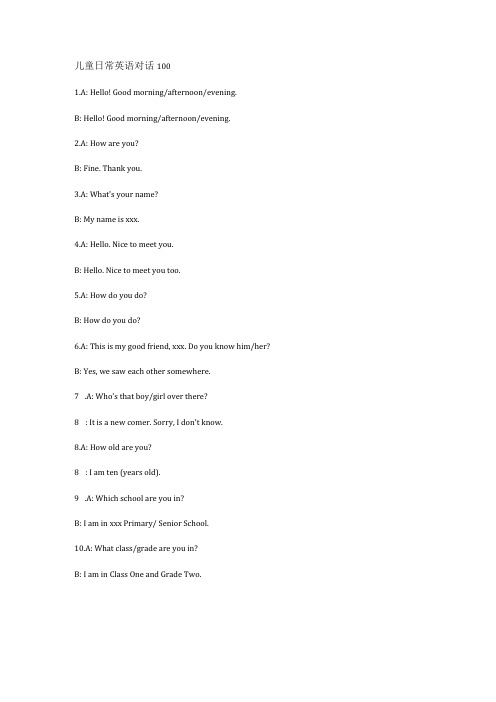
儿童日常英语对话1001.A: Hello! Good morning/afternoon/evening.B: Hello! Good morning/afternoon/evening.2.A: How are you?B: Fine. Thank you.3.A: What's your name?B: My name is xxx.4.A: Hello. Nice to meet you.B: Hello. Nice to meet you too.5.A: How do you do?B: How do you do?6.A: This is my good friend, xxx. Do you know him/her? B: Yes, we saw each other somewhere.7.A: Who's that boy/girl over there?8: It is a new comer. Sorry, I don't know.8.A: How old are you?8: I am ten (years old).9.A: Which school are you in?B: I am in xxx Primary/ Senior School.10.A: What class/grade are you in?B: I am in Class One and Grade Two.B: We live in XXX district.12.A: What does your father/mother do?B: He/she is a worker/ teacher/ doctor(B: He/she works in the office/ factory/ school/ hospital.)13.A: Have you learned English?B: Yes, a little/ some14.A: Do you like English/ Chinese/ math?B: Yes, I do(B: No, not very much)15.A: What is this?B: It is my toy.16.A: Is this your bag?B: Yes, it is. /No, it isn't17.A: Whose bag/book/pen is this?B: It is mine/ it is not mine.18.A: Do you want something to eat/drink?B: Yes, I want to drink some cold water/eat some fruit. 19.A: What did you have for lunch?B: We had some dishes and rice/ noodles.20.A: What food do you like? Help yourself to the dishes B: I like fish. It is delicious.21.A: What would you like to eat?B: I'd like to have some ice creams.22.A: What's on today on TV?8:There is a good film today on channel 623.A: What is your favourite programme on TV?B: Films and cartoons24.A: Can I watch TV a while.B: No, you have to finish your homework first.(B: OK. But only for about half an hour.)25.A: Turn on the TV/ air-conditioner, please.B: OK. But where is the remote control.26.A: Turn the TV down a little. It is too loud.B: All right. Is it OK?27.A: What's the weather like today?B: It is said it is going to rain.28.A: It is raining outside. Better take the umbrella with you. B: OK. But I'd like to take the raincoat with me.29.A: Lovely day isn't it?B: Yes it is.30.A: Today it is hot.B: I want some ice-creams/ cold water.31.A: Today it is very cold. Put on more clothes.B: OK/ I don't think so.32.A: What time is it?B: It is eight o'clock/ half past eight 8/ eight fifteen.33.A: Take it easy. It is still early.B: Your watch is slow. Let's hurry up.34.A: It is time to get up. It is seven thirty.B: Oh, I must be quick or I will be late.35.A: Come on. It is time for you to go to bed.B: But I am not sleepy/ I can't go to sleep.36.A: When do you get up everyday?B: I get up at seven and then wash my teeth and face.37.A: What day is it today?B: It is Wednesday today.38.A: What date is it today?B: I think it is 8th of May.39.A: How is everything at school?B: It is fine/ It is terrible.40.A: Can you swim/skate?B: Yes, I can/ Sorry, I can't41.A: Look, what you have done? You did it. Right? B: Sorry. I am terriblly sorry.42.A: What's happening? Why are you laughing? B: Nothing happened. It is just a joke.43.A: Who has done this? What a naughty boy/girl you are?B: sorry. I didn't do it on purpose44.A: What a nuisance? Who did it?B: Sorry. It is not me.45.A: I am sorry.B: That's all right.46.A: Well done. You have done a good job.B: Thank you.47.A: Thank you very muchB: You are welcome.48.A: Excuse me. Can I take this seat?B: Yes, of course.49.A: Excuse me. Can you tell me the way to the post office/station?8:You go straight on and turn left/right at the next traffic light. You will see it there.50.A: How long do you think it will take?8:I think it will take you about 20 minutes by bike.51.A: Do you like computer games?B: Yes, I like it very much.52.A: We are good friends now. Can you give this to me?B: Sorry. I am afraid not. One of my friends sent me.(B: Yes. But you'd better keep it secret.)53.A: What are you looking at?B: We are looking at our photo.54.A: Look at my photo. I took it when I was a boy/girl. B: It is great. What lovely it is!55.A: Mum/Dad, my shoes are too tight.B: Let's go shopping tomorrow and buy you new ones.56.A: How can we get there?B: We can go there by bus or by bike.57.A: Can I have a look at those clothes? How much is it? 8:Of course. It is 20 yuan.58.A: Miss, I want to go to the loo/toilet.B: OK. Wee wee here and poo poo there.59.A: What a mess! Keep your desk/bed tidy.B: I didn't do it but I will tidy it soon.60.A: Don't put things everywhere.B: OK. I will put them as they are.61.A: XXX, don't help yourself to the things here.B: No, I am just looking at them.62.A: Do you think it is true?B: I bet it is/ believe it or not.63.A: Do you like it? It is cool.B: I don't think so. I know there is a better one64.A: Your hands are dirty. Go and wash them.B: OK. But there is no water.65.A: Excuse me. Do you know xxx's telephone number?B: Yes, let me see./Sorry. I can't remember it66.A: Hello, this is xxx speaking.B: Who is speaking?67.A: Mum/Dad. You are wanted on the phone.B: OK. I am coming.68.A: Who is calling? Did he/she leave a message?B: I don't know who it is. He/She wants you to phone him/her back.69.A: May I turn on the radio/light/TV?B: Of course.70.A: May I use your eraser?B: certainly. Here you are.71.A: Will you please you pass me that paper?B: Of course. Here it is.72.A: Could you do me a favour?B: Yes. No problem.73.A: Can I open the window?B: Sorry. Better not. It is smelly outside.74.A: Can you follow me?B: Sorry. You are speaking too fast.75.A: Happy birthday to you. Here is a small present.B: Thank you very much. I am so happy.76.A: Happy New Year and merry Christmas!B: The same to you.77.A: What are you doing?B: I'm waiting for my classmate.78.A: What sports do you like?B: I like football and badminton.79.A: What shall we play today?B: Let's play football.80.A: Let's go and play football.B: OK, let's go right now.81.A: Do you have a computer?B: Yes. I often play games on it.82.A: Do you have any hobbies?B: Yes, I collect stamps.83.A: What's your favourite music/songs?B: My favourite is xxx.84.A: Tell you good news. I have won the first prize.B: Congratulations!85A: Which do you like better? Big/Red one or small/green one? B: I think I like big/green one.86.A: Do you like animals?B: Yes, my family has a dog as a pet.87.A: Do you agree with me?B: Yes, I do/ Sorry, I am afraid not.88.A: What do you think of my idea?B: It is a good idea.89.A: I am sorry to tell you that you failed to pass the exam. B: Oh, no, no. I am so sad to hear that.90.A: What's wrong with you?B: I have a cold.91.A: What's the matter with your leg?B: I fell down and it really hurts.92.A: How are you feeling today?B: Much better. Thanks.93.A: What are you going to do this weekend?B: I am going to swim/skate.94.A: Where are we going?B: It's up to you.95.A: Can you help me with my math?B: Sorry, I am not available now.96A: We are going to my father's hometown.B: Wish you a good trip!97.A: Why don't you tell me this?B: It's a secret. I won't tell others.98.A: Mum/Dad, can I have a word with you?B: Yes, what are you going to say?99.A: Mum/Dad, I don't think I can do it.B: Be confident. I am sure you can. 100.A: Goodbye. See you tomorrow. B: goodbye. See you.Welcome To Download欢迎您的下载,资料仅供参考!。
简单的英语对话-学前班、小学英语-重点语法剖析系列一

简单的英语对话--------学前班、小学英语——重点语法剖析系列一1.Do you like watching TV? What programs do you like most? Please describeyour favorite TV program and then talk about the advantages and disadvantages of watching TV.ever be empty, For I will be your wine.用这只手,我将带你走出忧愁困苦。
你的杯将永不干涸,因为我将是你幸福的源泉。
With this candle, I will light your way in darkness. Withthis ring, I ask you to be mine. 用这蜡烛,我将为你在黑暗中引路。
用这戒指,我要你成为我的妻子。
㈠《Shawshank Redemption肖申克的救赎》1.You know some birds are not meant to be caged, their feathers are just too bright. 你知道,有些鸟儿是注定不会被关在牢笼里的,它们的每一片羽毛都闪耀着自由的光辉。
2.There is something inside ,that they can't get to , that they can'ttouch. That's yours. 那是一种内在的东西, 他们到达不了,也无法触及的,那是你的。
3.Hope is a good thing and maybe the best of things. And no good thingever dies. 希望是一个好东西,也许是最好的,好东西是不会消亡的。
㈡《Forrest Gump 阿甘正传》1.Life was like a box of chocolates, you never know what you're gonnaget.生命就像一盒巧克力,结果往往出人意料。
小学英语口语对话素材整理

小学英语口语对话素材整理Nowadays, learning English has become increasingly important for elementary school students. English oral communication skills play a crucial role in their language development. To enhance these skills, it is essential for teachers to provide students with useful and engaging English dialogues. In this article, we will present a compilation of effective and diverse English dialogue materials that can be used in elementary school English classes.1. Introducing Oneself:Dialogue 1:A: Hello, my name is Lisa. What's your name?B: Hi, Lisa. I'm Jack. Nice to meet you.A: Nice to meet you too, Jack. Where are you from?B: I'm from New York. How about you?A: I'm from Los Angeles. What grade are you in?B: I'm in fourth grade. How about you?A: I'm in fifth grade.In this dialogue, students learn how to introduce themselves and ask simple questions about someone's name, place of origin, and grade level. It encourages them to have basic conversations with their peers.2. Talking About Hobbies:Dialogue 2:A: What do you like to do in your free time?B: I love playing soccer. It's so much fun.A: Oh, I enjoy playing soccer too. Do you play any other sports?B: Yes, I also like swimming. What about you?A: I like swimming as well. Have you ever tried playing basketball?B: No, I haven't. Maybe we can try it together someday.In this dialogue, students practice discussing their hobbies and exploring common interests. They learn how to ask follow-up questions and suggest doing activities together, fostering social interaction and bonding among classmates.3. Ordering Food at a Restaurant:Dialogue 3:A: Good afternoon. Welcome to our restaurant. How many people are in your party?B: There are four of us.A: Great. Please follow me to your table. Here are the menus.B: Thank you. Can I have a glass of water, please?A: Of course. What would you like to order?B: I'll have a cheeseburger and fries, please.A: Anything to drink?B: I would like a coke, please.This dialogue allows students to practice ordering food at a restaurant. By role-playing as customers and servers, they learn essential vocabulary related to food and beverages, as well as polite phrases for restaurant interactions.4. Talking About Daily Routines:Dialogue 4:A: What do you usually do after school?B: First, I finish my homework. Then, I play with my friends.A: What time do you have dinner?B: I usually have dinner at 6:30 pm.A: Do you watch TV before bedtime?B: No, I prefer reading books before going to sleep.This dialogue focuses on daily routines and encourages students to talk about their after-school activities and evening habits. It helps develop their ability to express time, sequence, and personal preferences.5. Planning an Outing:Dialogue 5:A: Hi, Sarah. What are you doing this weekend?B: Hi, Mark. I don't have any plans. Why?A: I was thinking we could go to the park. What do you think?B: That sounds like a great idea. What time should we meet?A: Let's meet at 10 am near the entrance. Don't forget to bring some snacks.B: Okay, see you on Saturday!This dialogue allows students to practice planning and organizing an outing with a friend. It helps them develop skills in suggesting and accepting ideas, arranging meeting times, and reminding each other about necessary preparations.These dialogues provide a range of topics for elementary school students to practice their English oral communication skills. Incorporating these materials into classroom activities will undoubtedly engage students in meaningful conversations while improvingtheir proficiency in spoken English. By providing them with opportunities to practice authentic dialogues, we can empower our young learners to become confident English speakers.。
简单的英语对话小学生

简单的英语对话小学生最简单的英语口语对话篇11. Make yourself at home!就当在家一样!2. My mouth is watering!我要流口水了!3. Never heard of it!没听说过!4. Nice talking to you!很高兴和你聊天!5. No doubt about it!勿庸置疑!6. No pain no gain!不经一事,不长一智!7. None of your business!要你管?8. There is nothing on your business!这没你的事! Now you are really talking!说得对!9. Please don't rush me!请不要吹促我!10. Please keep me informed!请一定要通知我!11. We better get going!最好马上就走!12. Absence makes the heart grow fonder. 小别胜新婚。
13. December heartbeat. 黄昏恋。
14. Don't get high hat.别摆臭架子.15. Don't get loaded. 别喝醉了。
16. Get cold feet. 害怕做某事。
17. Gild the lily. 画蛇添足。
最简单的英语口语对话篇2Price is soaring, if it goes on like this, we shall not be able to keep the pot boiling.物价直线上升,这样子下去,我们锅里可没什么东西煮饭。
What is the fuss? 吵什么?我代表北京市政府欢迎各位朋友访问北京。
On behalf of the Beijing Municipal government, I wish to extend our warm welcome to the friends who have come to visit Beijing. 我一定向他转达您的问候和邀请。
简单儿童英语对话
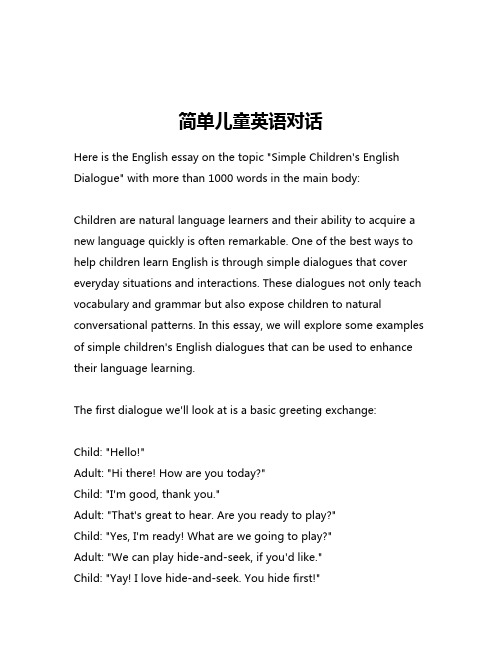
简单儿童英语对话Here is the English essay on the topic "Simple Children's English Dialogue" with more than 1000 words in the main body:Children are natural language learners and their ability to acquire a new language quickly is often remarkable. One of the best ways to help children learn English is through simple dialogues that cover everyday situations and interactions. These dialogues not only teach vocabulary and grammar but also expose children to natural conversational patterns. In this essay, we will explore some examples of simple children's English dialogues that can be used to enhance their language learning.The first dialogue we'll look at is a basic greeting exchange:Child: "Hello!"Adult: "Hi there! How are you today?"Child: "I'm good, thank you."Adult: "That's great to hear. Are you ready to play?"Child: "Yes, I'm ready! What are we going to play?"Adult: "We can play hide-and-seek, if you'd like."Child: "Yay! I love hide-and-seek. You hide first!"This dialogue covers common greetings, expressions of well-being, and an invitation to play a game. It introduces children to polite language and the back-and-forth nature of conversations. The vocabulary used is simple and the sentence structure is straightforward, making it easy for young learners to understand and practice.Another useful dialogue is one that focuses on introducing oneself:Child: "Hi, my name is Emily. What's your name?"Adult: "Hello Emily, my name is Mr. Smith. It's nice to meet you." Child: "It's nice to meet you too, Mr. Smith. How old are you?" Adult: "I'm 45 years old. How old are you, Emily?"Child: "I'm 7 years old. Do you have any children?"Adult: "Yes, I have two children. They're your age."Child: "That's cool! Do you have any pets?"Adult: "Yes, I have a dog named Buddy. Do you have any pets?" Child: "I have a cat named Whiskers. She's very cute!"This dialogue allows children to practice introducing themselves, asking and answering questions about age and family, and discussing pets. The language is simple and the exchange is natural, mimicking the type of conversation a child might have with a new adult acquaintance.Moving on, let's consider a dialogue that focuses on everyday activities:Child: "What are you doing?"Adult: "I'm reading a book. Would you like to read with me?" Child: "Yes, I love reading! What book are you reading?"Adult: "It's a story about a magical forest. Would you like me to read it to you?"Child: "Yes, please! I want to hear about the magical forest." Adult: "Okay, let's get comfortable and I'll start reading."(Adult reads the book aloud, pausing to ask questions and engage the child)Child: "Wow, that was a great story! Can we read another one?" Adult: "Of course, we can read as many as you'd like."This dialogue demonstrates how to invite a child to join in an activity, discuss the details of that activity, and then engage in the activity together. The language used is simple, with the adult modelling complete sentences and the child responding with shorter phrases. This type of dialogue can be adapted to various everyday activities, such as playing with toys, helping with chores, or enjoying a meal together.Finally, let's look at a dialogue that addresses a minor conflict orproblem:Child: "I don't want to take a bath!"Adult: "But it's time to get clean before bedtime. Baths are important to keep us healthy."Child: "I don't like baths, they're boring."Adult: "I understand, but baths can be fun too. We can play with toys in the water and sing songs."Child: "Okay, I guess a bath won't be so bad."Adult: "That's right, and when you're all clean, we can read a bedtime story."Child: "Yay, a bedtime story! Okay, I'll take a bath."Adult: "Good, let's get you ready for the tub."This dialogue demonstrates how to address a child's resistance to a task, validate their feelings, offer a compromise, and then redirect their attention to a positive outcome. The language used is simple and reassuring, with the adult modeling polite and respectful communication. This type of dialogue can be adapted to address various challenges children may face, such as refusing to eat a certain food, not wanting to share toys, or being afraid of the dark.In conclusion, these examples of simple children's English dialogues illustrate how language learning can be integrated into everyday interactions. By exposing children to natural conversations, usingage-appropriate vocabulary and sentence structures, and engaging them in active participation, we can help them develop their English language skills in a fun and meaningful way. These dialogues can be used as a starting point for further exploration and adaptation, allowing parents, teachers, and caregivers to tailor the content to the specific needs and interests of the children they work with.。
英语基本会话(学前班)
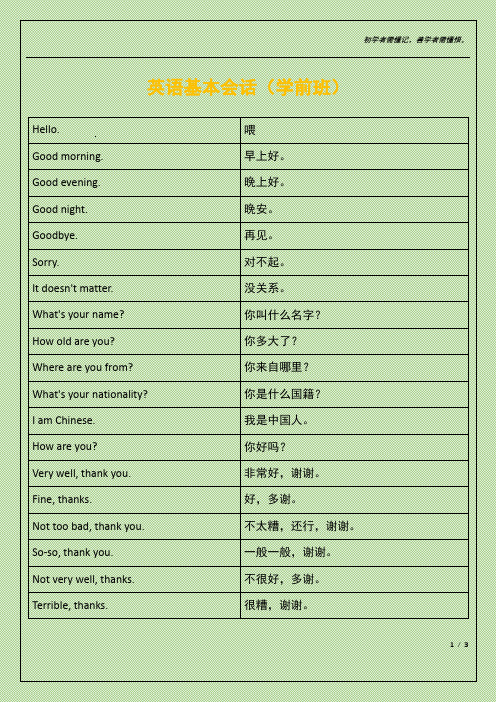
英语基本会话(学前班)Hello.喂Good morning.早上好。
Good evening.晚上好。
Good night.晚安。
Goodbye.再见。
Sorry.对不起。
It doesn't matter.没关系。
What's your name?你叫什么名字?How old are you?你多大了?Where are you from?你来自哪里?What's your nationality?你是什么国籍?I am Chinese.我是中国人。
How are you?你好吗?Very well, thank you.非常好,谢谢。
Fine, thanks.好,多谢。
Not too bad, thank you.不太糟,还行,谢谢。
So-so, thank you.一般一般,谢谢。
Not very well, thanks.不很好,多谢。
Terrible, thanks.很糟,谢谢。
What's the weather like today?今天天气怎样?It's sunny.晴天。
It's rainy.雨天。
It's windy.风天。
It's cloudy.阴天,多云。
It's snowy.雪天。
What time is it?几点了It's three o'clock.三点了。
This is a pencil.这是一支铅笔。
This isn't a pen.这不是一支钢笔。
Is this a pencil?这是一支铅笔吗?Yes, it is.是的,它是。
No, it isn't.不,它不是。
What's this?这是什么?It's a pencil.它是一支铅笔。
That is a dog.那是一只狗。
That isn't a dog.那不是一只狗。
Is that a dog?那是一只狗吗?Yes, it is.是的,它是。
简单的英语对话--学前班、小学英语——重点语法剖析系
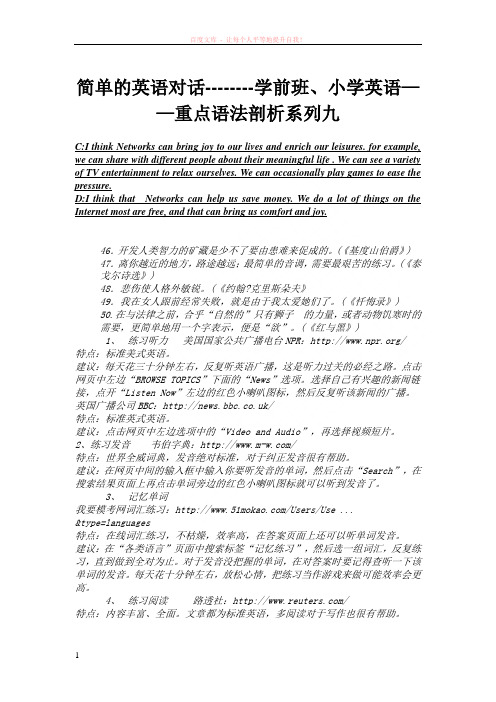
简单的英语对话--------学前班、小学英语——重点语法剖析系列九C:I think Networks can bring joy to our lives and enrich our leisures. for example, we can share with different people about their meaningful life . We can see a variety of TV entertainment to relax ourselves. We can occasionally play games to ease the pressure.D:I think that Networks can help us save money. We do a lot of things on the Internet most are free, and that can bring us comfort and joy.46.开发人类智力的矿藏是少不了要由患难来促成的。
(《基度山伯爵》) 47.离你越近的地方,路途越远;最简单的音调,需要最艰苦的练习。
(《泰戈尔诗选》)48.悲伤使人格外敏锐。
(《约翰?克里斯朵夫》49.我在女人跟前经常失败,就是由于我太爱她们了。
(《忏悔录》)50.在与法律之前,合乎“自然的”只有狮子的力量,或者动物饥寒时的需要,更简单地用一个字表示,便是“欲”。
(《红与黑》)1、练习听力美国国家公共广播电台NPR:/特点:标准美式英语。
建议:每天花三十分钟左右,反复听英语广播,这是听力过关的必经之路。
点击网页中左边“BROWSE TOPICS”下面的“News”选项。
选择自己有兴趣的新闻链接,点开“Listen Now”左边的红色小喇叭图标,然后反复听该新闻的广播。
英国广播公司BBC:/特点:标准英式英语。
建议:点击网页中左边选项中的“Video and Audio”,再选择视频短片。
常用儿童日常英语对话

常用儿童日常英语对话 (A Collection of Common Everyday English Conversations for Children)这份文档旨在提供一系列常用的儿童日常英语对话,涵盖各种场景,帮助孩子们学习和运用英语。
对话内容力求简单易懂,贴近儿童生活,并配以中文翻译,方便家长和老师指导孩子学习。
I. Greetings and Introductions (问候和介绍)1. Meeting Someone New (初次见面):•A:Hello! My name is Tom. What’s your name?•B: Hi Tom! My name is Lily. Nice to meet you.•A: Nice to meet you too, Lily.(中文翻译):•A:你好!我叫汤姆。
你叫什么名字?•B:你好汤姆!我叫莉莉。
很高兴认识你。
•A:很高兴认识你,莉莉。
2. Saying Goodbye (告别):•A: Goodbye, Lily! See you tomorrow!•B: Goodbye, Tom! See you tomorrow!(中文翻译):•A:再见,莉莉!明天见!•B:再见,汤姆!明天见!3. Saying Hello and How Are You? (问候和问好):•A: Hi, Mike! How are you today?•B:I’m fine, thank you. And you?•A:I’m great, thanks!(中文翻译):•A:你好,迈克!今天好吗?•B:我很好,谢谢。
你呢?•A:我很好,谢谢!II. At Home (在家)1. Asking for Help (寻求帮助):•Child: Mommy, can you help me with my homework?•Mother:Sure, honey. Let’s do it together.(中文翻译):•孩子:妈妈,你能帮我做作业吗?•妈妈:当然可以,宝贝。
儿童英语日常交流口语对话
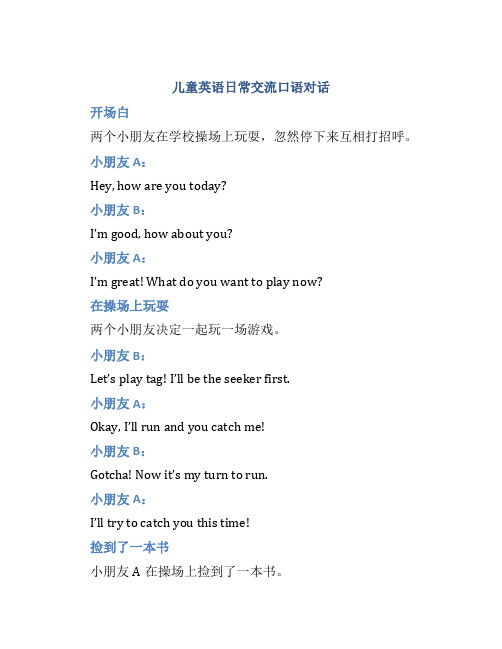
儿童英语日常交流口语对话开场白两个小朋友在学校操场上玩耍,忽然停下来互相打招呼。
小朋友A:Hey, how are you today?小朋友B:I’m good, how about you?小朋友A:I’m great! What do you want to play now?在操场上玩耍两个小朋友决定一起玩一场游戏。
小朋友B:Let’s play tag! I’ll be the seeker first.小朋友A:Okay, I’ll run and you catch me!小朋友B:Gotcha! Now it’s my turn to run.小朋友A:I’ll try to catch you this time!捡到了一本书小朋友A在操场上捡到了一本书。
小朋友A:Look what I found! It’s a book.小朋友B:Wow, it looks interesting. Let’s read it together.小朋友A:Sure, I’ll read the first page.下课后的计划下课铃声响了,小朋友们一起商量下课后要做什么。
小朋友B:Do you want to go to the playground after school?小朋友A:Yes, I would love to play on the swings!小朋友B:Great, let’s meet at the swings at 3 o’clock.在游乐场上两个小朋友在游乐场上玩得开心。
小朋友A:This is so much fun! I love going on the merry-go-round.小朋友B:I prefer the slides, they are really cool!小朋友A:Let’s take turns on each ride, I can’t wait!结束语下午在游乐场过得很愉快,两个小朋友一起边走回家边聊天。
简单的英语对话--------学前班、小学英语——重点语法剖析系列十
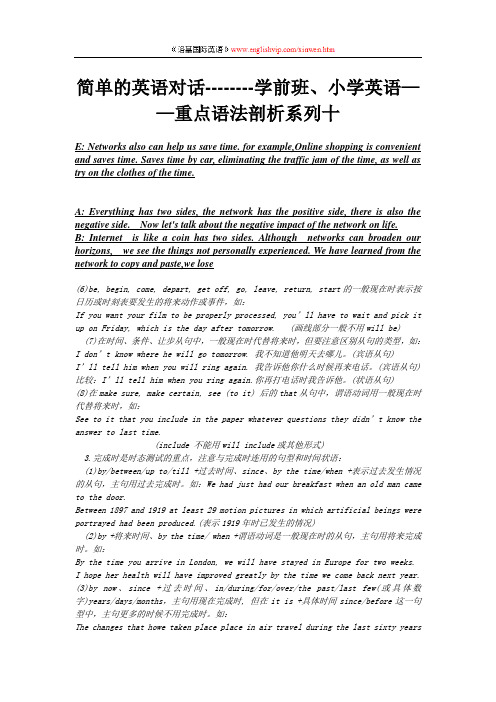
简单的英语对话--------学前班、小学英语——重点语法剖析系列十E: Networks also can help us save time. for example,Online shopping is convenient and saves time. Saves time by car, eliminating the traffic jam of the time, as well as try on the clothes of the time.A: Everything has two sides, the network has the positive side, there is also the negative side. Now let's talk about the negative impact of the network on life.B: Internet is like a coin has two sides. Although networks can broaden our horizons, we see the things not personally experienced. We have learned from the network to copy and paste,we lose(6)be, begin, come, depart, get off, go, leave, return, start的一般现在时表示按日历或时刻表要发生的将来动作或事件,如:If you want your film to be properly processed, you’ll have to wait and pick it up on Friday, which is the day after tomorrow. (画线部分一般不用will be)(7)在时间、条件、让步从句中,一般现在时代替将来时,但要注意区别从句的类型,如:I don’t know where he will go tomorrow. 我不知道他明天去哪儿。
小学英语简单对话
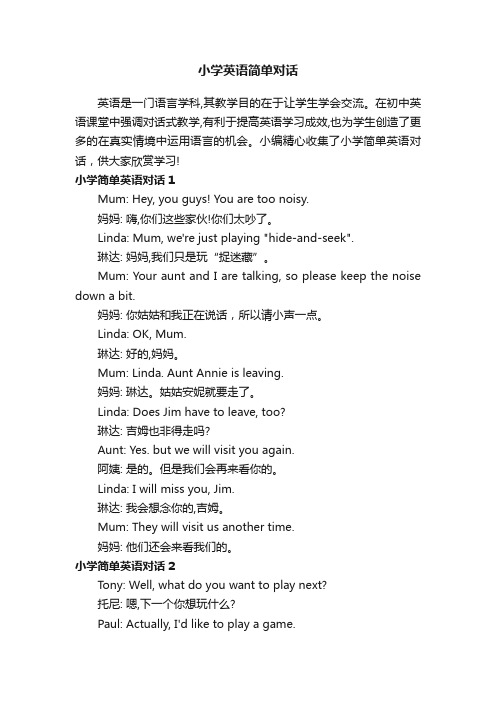
小学英语简单对话英语是一门语言学科,其教学目的在于让学生学会交流。
在初中英语课堂中强调对话式教学,有利于提高英语学习成效,也为学生创造了更多的在真实情境中运用语言的机会。
小编精心收集了小学简单英语对话,供大家欣赏学习!小学简单英语对话1Mum: Hey, you guys! You are too noisy.妈妈: 嗨,你们这些家伙!你们太吵了。
Linda: Mum, we're just playing "hide-and-seek".琳达: 妈妈,我们只是玩“捉迷藏”。
Mum: Your aunt and I are talking, so please keep the noise down a bit.妈妈: 你姑姑和我正在说话,所以请小声一点。
Linda: OK, Mum.琳达: 好的,妈妈。
Mum: Linda. Aunt Annie is leaving.妈妈: 琳达。
姑姑安妮就要走了。
Linda: Does Jim have to leave, too?琳达: 吉姆也非得走吗?Aunt: Yes. but we will visit you again.阿姨: 是的。
但是我们会再来看你的。
Linda: I will miss you, Jim.琳达: 我会想念你的,吉姆。
Mum: They will visit us another time.妈妈: 他们还会来看我们的。
小学简单英语对话2Tony: Well, what do you want to play next?托尼: 嗯,下一个你想玩什么?Paul: Actually, I'd like to play a game.保罗: 其实,我想玩个游戏。
Tony: Which one?托尼: 什么游戏?Paul: The one where you try to hit the moving ducks with a baseball.保罗: 用棒球击移动的鸭子的那个游戏。
学前班教师常用英语口语
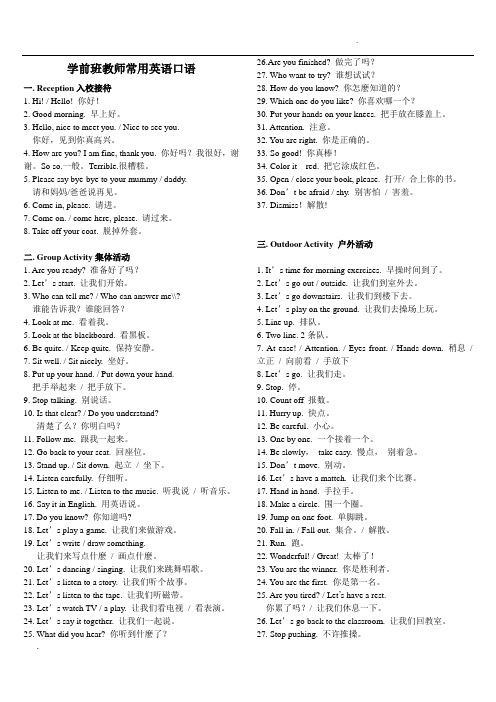
学前班教师常用英语口语一. Reception入校接待1. Hi! / Hello! 你好!2. Good morning. 早上好。
3. Hello, nice to meet you. / Nice to see you.你好,见到你真高兴。
4. How are you? I am fine, thank you. 你好吗?我很好,谢谢。
So so.一般。
Terrible.很糟糕。
5. Please say bye-bye to your mummy / daddy.请和妈妈/爸爸说再见。
6. Come in, please. 请进。
7. Come on. / come here, please. 请过来。
8. Take off your coat. 脱掉外套。
二. Group Activity集体活动1. Are you ready? 准备好了吗?2. Let’s start. 让我们开始。
3. Who can tell me? / Who can answer me\\?谁能告诉我?谁能回答?4. Look at me. 看着我。
5. Look at the blackboard. 看黑板。
6. Be quite. / Keep quite. 保持安静。
7. Sit well. / Sit nicely. 坐好。
8. Put up your hand. / Put down your hand.把手举起来/ 把手放下。
9. Stop talking. 别说话。
10. Is that clear? / Do you understand?清楚了么?你明白吗?11. Follow me. 跟我一起来。
12. Go back to your seat. 回座位。
13. Stand up. / Sit down. 起立/ 坐下。
14. Listen carefully. 仔细听。
15. Listen to me. / Listen to the music. 听我说/ 听音乐。
简单的儿童英语对话

简单的儿童英语对话日常的英语场景对话,可以帮助孩子们提高英语成绩。
小编在献上少儿英语,希望对你有所帮助。
少儿英语:钢丝We can laugh ha-ha我们可以笑哈哈We can sing la-la-la-la我们可以唱la-la-la-laWe can make anything我们可以做任何事情Hold my hand握住我的手Make a magical land创造一片神奇的土地When letters get together we go alakazam当字母集合我们一起去alakazamWe can run, we can slide We can hide in a box我们可以跑步,我们可以滑行,我们可以躲在一个箱子里Are you ready for some fun with the Alphablocks?你准备好了和字母块们一起愉快玩耍吗?Alphablocks!字母块!Rrrr!Rrrr!Rr!Rr!Rrr!Rrr!RRRR!RRRR!H-h-h-h...Hey! Look, G!H-h-h-h…嘿!看,G!Goodness! What's that?天哪!那是什么?Huh! It's a rope.哈!这是一根绳子。
I-Incredible!难以置信!I LOVE skipping!我喜欢跳绳!I'm so incredible, I am I!我很不可思议的,我是I!I'm so important, I, I, I!我如此重要,我,我,我!- I... I-I-I... - My go!——我……I-I-I……——我去!I'll take that.我要带。
ALL: Igh!所有:Igh!Igh, igh, igh!Igh,Igh,Igh!Did I hear my name? Did someone say "I"? 我听到我的名字吗?有人说“我”吗?ALL: Igh! Igh!所有:Igh!Igh!Let's jump HIGH!让我们跳得高!Igh-igh-igh-igh-igh-igh-igh!Igh-igh-igh-igh-igh-igh-igh!- T! - Only I can say I.-T!——只有我能说I。
少儿英语口语日常对话

【导语】少⼉英语遵循少⼉语⾔学习的规律,开展具有针对性、趣味性的英语教学活动,让少⼉积极地参与到活泼、⽣动的英语学习中。
以下是⽆忧考整理的少⼉英语⼝语⽇常对话,欢迎阅读!1.少⼉英语⼝语⽇常对话 I like grapes 我喜欢葡萄 Bobby: I like grapes. How about you? Betty: I don't like grapes. I like watermelons. Kimmy: Do you like apples? Amy: Yes,I do. Kimmy: Do you like bananas? Amy: No,I don't. Tommy: What's your favorite fruit? Judy: My favorite fruit is grapes. 鲍⽐:我喜欢葡萄。
你呢? 贝蒂:我不喜欢葡萄。
我喜欢西⽠。
吉⽶:你喜欢苹果吗? 艾⽶:是的,我喜欢。
吉⽶:你喜欢⾹蕉吗? 艾⽶:不,我不喜欢。
汤⽶:你最喜欢的⽔果是什么? 朱迪:我最喜欢的⽔果是葡萄。
2.商务英语⼝语考试要点 商务英语考试和其他的英语类考试有很⼤的差别,因为添加了英语⼝语考试,所以难度很⼤。
对于⼤部分的中国考⽣来说,商务英语⼝语都⽐较困难。
1、问答 这⾥的问答千万不要讲太多,长篇⼤论,⼀到两句话清晰表达你⾃⼰的观点就可以了。
通常分两⼤类的题⽬,⼀种是你⾃⾝相关,例如你打算从事什么职业,或者介绍下你⾃⼰。
第⼆种是职业话题相关,例如你怎么看现在xxx商业现象之类的问题,简短回答就好,不要⽤复杂的从句,避免不必要的失误。
⾸先你要把真题⾥出现过的问题要全部准备,其次是教辅资料总结的近年来考官最喜欢问的问题。
2、简短演讲 这部分你要围绕某个话题发表⼀分钟的演讲,然后你的搭档要就你的演讲向你提出⼀个问题让你回答。
⽼师会给你⼀张纸,上⾯写着三个话题,你可以选⼀个你有把握的话题来讲,会给你纸笔写⼤纲有⼀分钟的准备时间。
简单英语对话
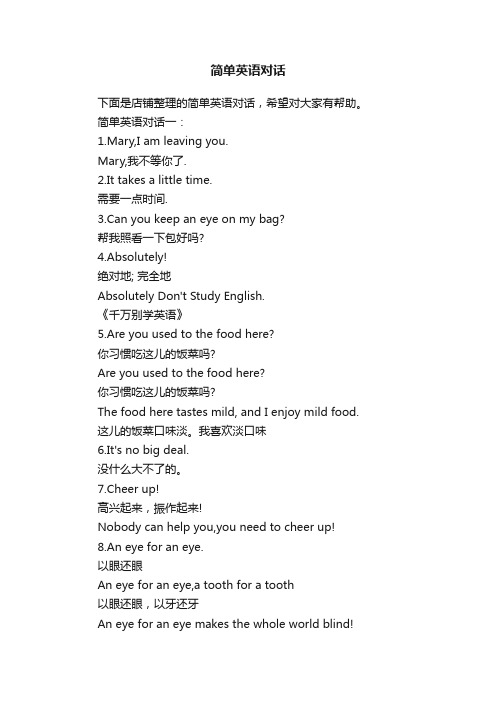
简单英语对话下面是店铺整理的简单英语对话,希望对大家有帮助。
简单英语对话一:1.Mary,I am leaving you.Mary,我不等你了.2.It takes a little time.需要一点时间.3.Can you keep an eye on my bag?帮我照看一下包好吗?4.Absolutely!绝对地; 完全地Absolutely Don't Study English.《千万别学英语》5.Are you used to the food here?你习惯吃这儿的饭菜吗?Are you used to the food here?你习惯吃这儿的饭菜吗?The food here tastes mild, and I enjoy mild food. 这儿的饭菜口味淡。
我喜欢淡口味6.It's no big deal.没什么大不了的。
7.Cheer up!高兴起来,振作起来!Nobody can help you,you need to cheer up!8.An eye for an eye.以眼还眼An eye for an eye,a tooth for a tooth以眼还眼,以牙还牙An eye for an eye makes the whole world blind!以眼还眼,世界只会更加盲目!9.Actions speak louder than words.行动胜于空谈.Don't tell me how to do this; show me! Actions speak louder than words不要(只是)告诉我怎么做,做给我看!行动胜于空谈10.Long time no see.好久不见!简单英语对话二:Welcome to our hotel, miss Henry.欢迎来到我们酒店,享利小姐。
It’s no big deal.没什么大不了的。
简单的儿童英语口语对话

简单的儿童英语口语对话,,xx日常的英语场景对话,可以帮助孩子们提高英语成绩。
我在献上少儿英语,希望对你有所帮助。
少儿英语:喂We can laugh ha-ha 我们可以笑哈哈We can sing la-la-la-la我们可以唱la-la-la-laWe can make anything我们可以做任何事情Hold my hand握住我的手Make a magical land创造一片神奇的土地When letters get together we go alakazam当字母集合我们一起去alakazamWe can run, we can slide We can hide in a box我们可以跑步,我们可以滑行,我们可以躲在一个箱子里Are you ready for some fun with the Alphablocks?你准备好了和字母块们一起愉快玩耍吗?Alphablocks!字母块!SNORING打鼾Ssss... Say!Ssss…说!We have a super special something for you now.我们现在有一个超级特别的东西给你。
The Alphablocks animal sing-song!字母块动物歌咏!CHEERING 欢呼And... Start! S...和…开始了!S……- A... - O...——A……-O…S... Sorry, everyone. Silly me.S……对不起,每一个人。
愚蠢的我。
I didn't say what to sing. Simple.我没有说什么唱歌。
简单。
Hold hands, and sing what you see!牵手,唱你所看到的!S... So, start!S……所以,开始!- C... - A... - T...-C…——A……-T…ALL: Cat!所有:猫!MIAOW!猫叫!- D... - O... - G...-D…-O…-G…ALL: Dog!所有:狗!RUFF!汪!MIAOWING AND WOOFING喵,汪CAT LAUGHS猫笑Hey, look at that, a dog and a cat嘿,看,一只狗和一只猫The dog chased the cat all around狗追赶猫The little cat laughed to see such fun看到这样的乐趣小猫笑了And the dog fell asleep on the ground. Hey!和狗在地上睡着了。
小学简单的英语口语对话
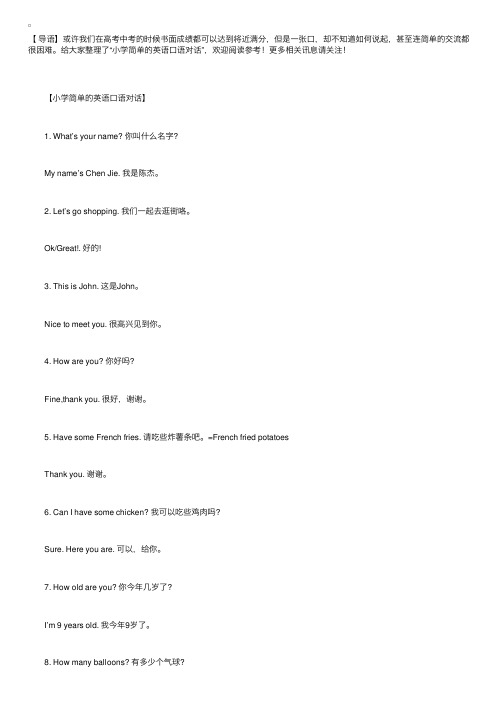
【导语】或许我们在⾼考中考的时候书⾯成绩都可以达到将近满分,但是⼀张⼝,却不知道如何说起,甚⾄连简单的交流都很困难。
给⼤家整理了“⼩学简单的英语⼝语对话”,欢迎阅读参考!更多相关讯息请关注! 【⼩学简单的英语⼝语对话】 1. What’s your name? 你叫什么名字? My name’s Chen Jie. 我是陈杰。
2. Let’s go shopping. 我们⼀起去逛街咯。
Ok/Great!. 好的! 3. This is John. 这是John。
Nice to meet you. 很⾼兴见到你。
4. How are you? 你好吗? Fine,thank you. 很好,谢谢。
5. Have some French fries. 请吃些炸薯条吧。
=French fried potatoes Thank you. 谢谢。
6. Can I have some chicken? 我可以吃些鸡⾁吗? Sure. Here you are. 可以,给你。
7. How old are you? 你今年⼏岁了? I’m 9 years old. 我今年9岁了。
8. How many balloons? 有多少个⽓球? Three. ⽓球 [bə'lun] 三个 9. Where are you from? 你来⾃哪⾥? I'm from America 我来⾃美国。
10. Who's that woman/girl? 那个⼥⼈/⼥孩是谁? She's my mother/sister. 她是我妈妈/姐姐。
11. Who's that man/boy? 那个男⼈/男孩是谁? He's my father/brother 他是我的爸爸/兄弟。
12. Let's watch TV. 我们⼀起看电视吧。
Great! 好的。
小学生英语口语对话精选全文

可编辑修改精选全文完整版小学生英语口语练习经典对话一、交际1. Hello, …你好。
2. Hi, …喂,你好。
3. Good morning/ afternoon/evening. 早上/下午/晚上好。
4. How are you(this morning/afternoon/evening) 你今天好吗?5. Fine, thank you/ thanks. 我很好,谢谢。
6. Not bad, thank you. 不错,谢谢。
7. Welcome back to school. 欢迎回到学校来。
8. Welcome to our school. 欢迎到我们学校来。
9. Happy birthday! 生日快乐!10. What’s your name, please 你的名字是什么?11. Your name, please 你叫什么名字?12. My name is…/ I’m…我的名字是…/ 我名叫…13. This is Miss/ Mr/ Mrs…这位是…小姐/先生/女士。
14. This is my friend. 这是我的朋友。
15. Come and meet my friends. 过来见见我的朋友们。
16. How do you do 你好。
17. Nice to meet /see you. 很高兴认识/见到你。
18. Goodbye. 再见19. Good night. 晚安。
20. How old is he 他多大了?21. Thank you./ Thanks. 谢谢。
22. You’re welcome. 不用谢。
23. That’s all right. 没关系。
24. I’m sorry. 对不起。
25. Sorry, I don’t know. 对不起,我不知道。
26. Excuse me. 对不起,打扰一下。
27. Come in, please. 请进。
- 1、下载文档前请自行甄别文档内容的完整性,平台不提供额外的编辑、内容补充、找答案等附加服务。
- 2、"仅部分预览"的文档,不可在线预览部分如存在完整性等问题,可反馈申请退款(可完整预览的文档不适用该条件!)。
- 3、如文档侵犯您的权益,请联系客服反馈,我们会尽快为您处理(人工客服工作时间:9:00-18:30)。
简单的英语对话--------学前班、小学英语——重点语法剖析系列九
C:I think Networks can bring joy to our lives and enrich our leisures. for example, we can share with different people about their meaningful life . We can see a variety of TV entertainment to relax ourselves. We can occasionally play games to ease the pressure.
D:I think that Networks can help us save money. We do a lot of things on the Internet most are free, and that can bring us comfort and joy.
46.开发人类智力的矿藏是少不了要由患难来促成的。
(《基度山伯爵》) 47.离你越近的地方,路途越远;最简单的音调,需要最艰苦的练习。
(《泰戈尔诗选》)
48.悲伤使人格外敏锐。
(《约翰?克里斯朵夫》
49.我在女人跟前经常失败,就是由于我太爱她们了。
(《忏悔录》)
50.在与法律之前,合乎“自然的”只有狮子的力量,或者动物饥寒时的
需要,更简单地用一个字表示,便是“欲”。
(《红与黑》)
1、练习听力美国国家公共广播电台NPR:/
特点:标准美式英语。
建议:每天花三十分钟左右,反复听英语广播,这是听力过关的必经之路。
点击网页中左边“BROWSE TOPICS”下面的“News”选项。
选择自己有兴趣的新闻链接,点开“Listen Now”左边的红色小喇叭图标,然后反复听该新闻的广播。
英国广播公司BBC:/
特点:标准英式英语。
建议:点击网页中左边选项中的“Video and Audio”,再选择视频短片。
2、练习发音韦伯字典:/
特点:世界全威词典,发音绝对标准,对于纠正发音很有帮助。
建议:在网页中间的输入框中输入你要听发音的单词,然后点击“Search”,在搜索结果页面上再点击单词旁边的红色小喇叭图标就可以听到发音了。
3、记忆单词
我要模考网词汇练习:/Users/Use ...
&type=languages
特点:在线词汇练习,不枯燥,效率高,在答案页面上还可以听单词发音。
建议:在“各类语言”页面中搜索标签“记忆练习”,然后选一组词汇,反复练习,直到做到全对为止。
对于发音没把握的单词,在对答案时要记得查听一下该单词的发音。
每天花十分钟左右,放松心情,把练习当作游戏来做可能效率会更高。
4、练习阅读路透社:/
特点:内容丰富、全面。
文章都为标准英语,多阅读对于写作也很有帮助。
建议:每天花二十分钟左右,选一篇自己有兴趣的文章阅读,以泛读为主。
对于生词的发音,可以用韦伯字典网站查发音。
对于不懂的词汇和句子,可以用Google英译中来翻译。
5、翻译
Google中译英:/tran ... &tl=zh-CN#zh-CN|en| Google英译中:/tran ...
=en&tl=zh-CN#en|zh-CN|
特点:方便,实用。
单词、句子都可以翻译。
建议:主要用来翻译单词、词组、和短句。
长句的翻译有时候可能不太准确,需要加以分析和判别。
一、时态、语态需要掌握的要点:
1.以下几类动词一般不能用于进行时,同样不用于完成进行时:
(1)表示感知的动词:hear, feel, notice, recognize, see, taste, smell;
(2)表示意愿、情感的动词:desire, dislike, forgive, hate, like, love, prefer, refuse, want, wish, fear, love, hate;
(3)表示思考、看法的动词:believe, doubt, expect, forget, hope, feel, mean, know, agree, realize, mind, recall, recollect, remember, trust, suppose;
(4)表示所有、占有的动词:belong to, owe, own, possess, hold(容纳);
(5)其他动词:cost, appear, concern, contain, consist, deserve, matter, seem。
如:I’d say whenever you are going after something that is belonging to you, anyone who is depriving you of the right to have it is criminal. (1997年考研题, belong表示归属,不用于进行式)
He was seeing somebody creeping into the house through the open window last night.
(1990年考研题,see表示结果,不用于进行式) 2. 不用will/shall表达将来时的形式:
(1)be going to表示现在的打算和意图;
(2)arrive, come, drive, go, leave, retire, return, set off, start, take off等表示移位的动词的进行体表示按计划肯定要发生的将来动作;
(3)be to (do)表示安排、计划、决定、命令或注定要发生的事,如:
Greater efforts to increase agricultural production must be made if food shortage is to be avoided.
(4)be about to (do)表示将要(做),如:
Marlin is a young man of independent thinking who is not about to pay compliments to his political leaders.
(5)be on the point /verge of (doing)表示“马上就要”,一般不与表示将来的时间状语连用;
的不平等。
(《总统先生》)。
